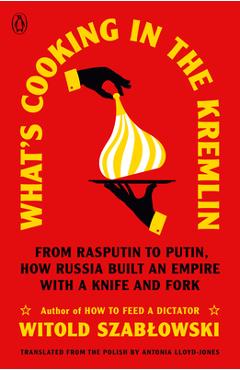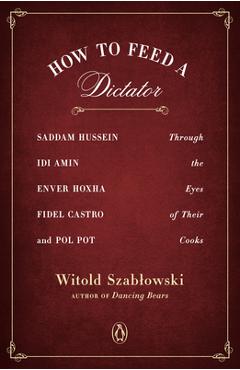What\'s Cooking in the Kremlin: From Rasputin to Putin, How Russia Built an Empire with a Knife and Fork - Witold Szablowski

Detalii What\'s Cooking in the Kremlin:
libris.ro
111.6 Lei
124 Lei
History
Witold Szablowski
What\'s Cooking in the Kremlin: - Disponibil la libris.ro
Pe YEO găsești What\'s Cooking in the Kremlin: de la Witold Szablowski, în categoria History.
Indiferent de nevoile tale, What\'s Cooking in the Kremlin: From Rasputin to Putin, How Russia Built an Empire with a Knife and Fork - Witold Szablowski din categoria History îți poate aduce un echilibru perfect între calitate și preț, cu avantaje practice și moderne.
Preț: 111.6 Lei
Caracteristicile produsului What\'s Cooking in the Kremlin:
- Brand: Witold Szablowski
- Categoria: History
- Magazin: libris.ro
- Ultima actualizare: 28-10-2025 01:22:05
Comandă What\'s Cooking in the Kremlin: Online, Simplu și Rapid
Prin intermediul platformei YEO, poți comanda What\'s Cooking in the Kremlin: de la libris.ro rapid și în siguranță. Bucură-te de o experiență de cumpărături online optimizată și descoperă cele mai bune oferte actualizate constant.
Descriere magazin:
A high-spirited, eye-opening, appetite-whetting culinary travel adventure by an award-winning Polish journalist that tells the story of the last hundred years of Russian power through food In the gonzo spirit of Anthony Bourdain and Hunter S. Thompson, Witold Szablowski has tracked down--and broken bread with--people whose stories of working in Kremlin kitchens impart a surprising flavor to our understanding of one of the world\'s superpowers. In revealing what Tsar Nicholas II\'s and Lenin\'s favorite meals were, why Stalin\'s cook taught Gorbachev\'s cook to sing to his dough, how Stalin had a food tester while he was starving the Ukrainians during the Great Famine, what the recipe was for the first soup flown into outer space, why Brezhnev hated caviar, what was served to the Soviet Union\'s leaders at the very moment they decided the USSR should cease to exist, and whether Putin\'s grandfather really did cook for Lenin and Stalin, Szablowski has written a fascinating oral history--complete with recipes and photos--of Russia\'s evolution from culinary indifference to decadence, famine to feasts, and of the Kremlin\'s Olympics-style preoccupation with food as an expression of the country\'s global standing. Traveling across Stalin\'s Georgia, the war fronts of Afghanistan, the nuclear wastelands of Chornobyl, and even to a besieged steelworks plant in Mariupol--often with one-of-a-kind access to locales forbidden to foreign eyes, and with a rousing sense of adventure and an inimitable ability to get people to spill the tea--he shows that a century after the revolution, Russia still uses food as an instrument of war and feeds its people on propaganda.

Produse asemănătoare

What\'s Cooking in the Kremlin: From Rasputin to Putin, How Russia Built an Empire with a Knife and Fork - Witold Szablowski
![]() libris.ro
libris.ro
Actualizat in 28/10/2025
111.6 Lei

Alice\'s Adventures in Wonderland and Through the Looking Glass and What Alice Found There, Hardcover/Lewis Carroll
![]() elefant.ro
elefant.ro
Actualizat in 28/10/2025
89.9 Lei

What\'s Cooking in the Kremlin. A Modern History of Russia Through the Kitchen Door, Hardback/Witold Szablowski
![]() elefant.ro
elefant.ro
Actualizat in 27/10/2025
144.99 Lei

Alice\'s Adventures in Wonderland & Through the Looking-Glass: And What Alice Found There | Lewis Carroll
![]() carturesti.ro
carturesti.ro
Actualizat in 27/10/2025
58 Lei

What\'s Cooking in the Kremlin. A Modern History of Russia Through the Kitchen Door, Paperback/Witold Szablowski
![]() elefant.ro
elefant.ro
Actualizat in 26/10/2025
79.99 Lei
Produse marca Witold Szablowski

What\'s Cooking in the Kremlin: From Rasputin to Putin, How Russia Built an Empire with a Knife and Fork - Witold Szablowski
![]() libris.ro
libris.ro
Actualizat in 28/10/2025
111.6 Lei

Dancing Bears: True Stories of People Nostalgic for Life Under Tyranny - Witold Szablowski
![]() libris.ro
libris.ro
Actualizat in 28/10/2025
142.85 Lei

